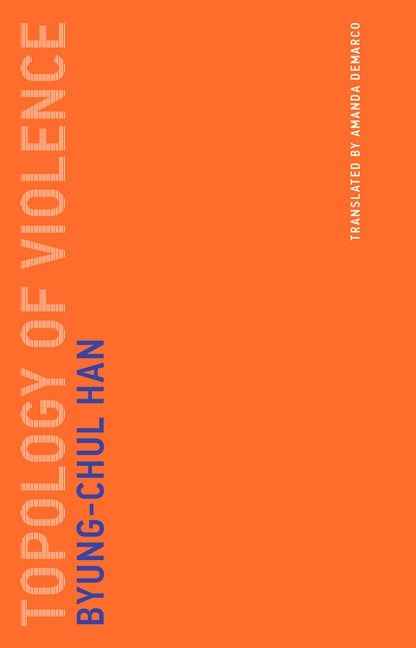The Topology of Violence

Editorial MIT Press
Fecha de edición abril 2018 · Edición nº 1
Idioma inglés
EAN 9780262534956
168 páginas
Libro
encuadernado en tapa blanda
Resumen del libro
One of today's most widely read philosophers considers the shift in violence from visible to invisible, from negativity to excess of positivity.
Some things never disappear -- violence, for example. Violence is ubiquitous and incessant but protean, varying its outward form according to the social constellation at hand. In Topology of Violence, the philosopher Byung-Chul Han considers the shift in violence from the visible to the invisible, from the frontal to the viral to the self-inflicted, from brute force to mediated force, from the real to the virtual. Violence, Han tells us, has gone from the negative -- explosive, massive, and martial -- to the positive, wielded without enmity or domination. This, he says, creates the false impression that violence has disappeared. Anonymized, desubjectified, systemic, violence conceals itself because it has become one with society.
Han first investigates the macro-physical manifestations of violence, which take the form of negativity -- developing from the tension between self and other, interior and exterior, friend and enemy. These manifestations include the archaic violence of sacrifice and blood, the mythical violence of jealous and vengeful gods, the deadly violence of the sovereign, the merciless violence of torture, the bloodless violence of the gas chamber, the viral violence of terrorism, and the verbal violence of hurtful language. He then examines the violence of positivity -- the expression of an excess of positivity -- which manifests itself as over-achievement, over-production, over-communication, hyper-attention, and hyperactivity. The violence of positivity, Han warns, could be even more disastrous than that of negativity. Infection, invasion, and infiltration have given way to infarction.
Biografía del autor
Byung-Chul Han (Seúl, Corea del Sur, 1959) es un filósofo y ensayista experto en estudios culturales. Se le considera uno de los filósofos más destacados del pensamiento contemporáneo por su crítica al capitalismo y la sociedad del trabajo. <br> Han estudió Filología Alemana y Teología en la Universidad de Múnich y Filosofía en la Universidad de Friburgo, donde se doctoró con una tesis sobre Martin Heidegger. Ha dado clases de Filosofía en la Universidad de Basilea, de Filosofía y Teoría de los medios en la Escuela Superior de Diseño de Karlsruhe y de Filosofía y Estudios culturales en la Universidad de las Artes de Berlín.<br> Es autor de más de una veintena de títulos entre los que cabe destacar: La sociedad del cansancio, La sociedad de la transparencia, Psicopolítica, No-cosas, Infocracia y Vida contemplativa. Todos ellos han sido traducidos a varios idiomas.<br> El trabajo de Han une tradiciones filosóficas orientales y occidentales, tomando ideas de pensadores como Friedrich Nietzsche, Martin Heidegger, Michel Foucault, Sigmund Freud, Hannah Arendt y Walter Benjamin, entre otros. Explora temas como la tecnología y los efectos del neoliberalismo en los diversos aspectos de la vida humana, el poder, la comunicación, la vigilancia, el consumismo, el trabajo, la autoexplotación, la transparencia, los rituales, la inactividad y las identidades individuales y colectivas; y es considerado como el sucesor de pensadores como Roland Barthes o Giorgio Agamben.








